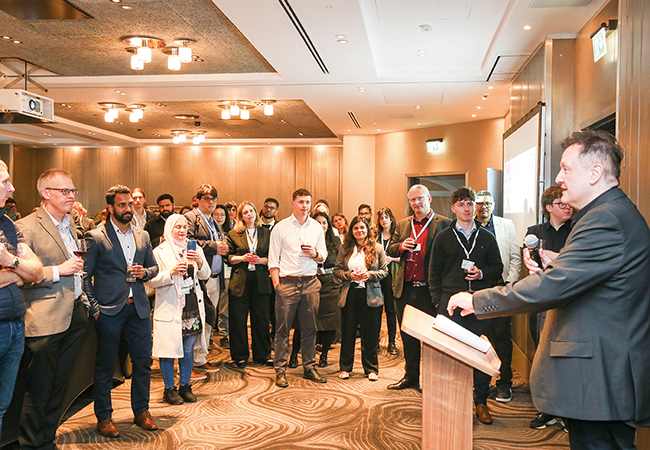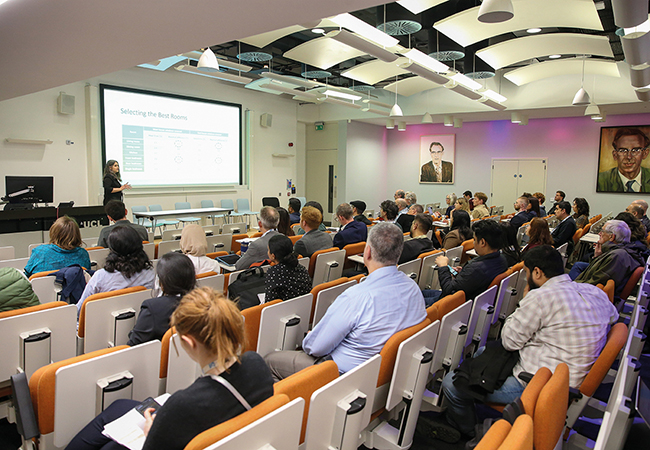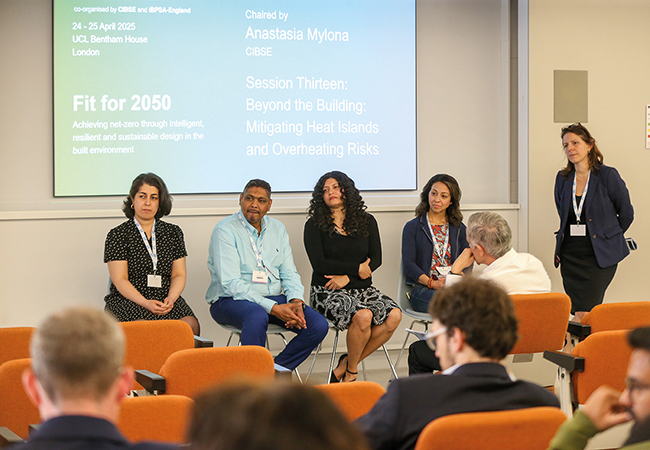
Dejan Mumovic welcomes delegates to the buffet reception hosted by Mason UK
Presentations exploring the emerging potential of artificial intelligence (AI) in building services were among the most popular on day two of the CIBSE and IBPSA-England Technical Symposium, hosted by University College London in April.
The event culminated in an electronic vote by delegates for the two best papers presented during the two-day symposium. Simon Ho won the Most Effective Delivery of Material award with his presentation ‘Are we building services engineers?’, while Meysam Akbari Paydar was awarded with Most Significant Contribution to the Art and Science of Building Services Engineering for his presentation on ‘Evaluating the potential of using energy certification models to assess decarbonisation pathways for primary healthcare buildings’.
Day one of the symposium was covered in last month’s CIBSE Journal, but as we went to press, a lively debate took place around the challenges and potential of the UK Net Zero Carbon Buildings Standard. Hosted by UCL’s Anna Mavrogianni and Rokia Raslan, the session was held under Chatham House rules, so no comments have been attributed to individuals.
Some panellists questioned the introduction of yet another standard and the industry’s ability to absorb it while others praised the collaborative and wholistic approach it brings to the industry
A key message in a packed session covering AI and parametric tools was the shift from linear to collaborative design.
Inés Idzikowski Pérez, senior sustainability consultant at Aecom, shared a case study of a hotel in Spain where early-stage optioneering reduced upfront embodied carbon by 36%. ‘We shifted the process from siloed decision-making to a circular design model,’ she said, adding that a dashboard was used to allow teams to explore materials, cost and environmental impact together. ‘It made the conversation visual and helped clients engage with sustainability.’

One of the theatres at UCL
Carl-Magnus von Behr, co-founder of innex.ai, introduced an AI platform built for the NHS estate sector to solve the ‘information overload’ engineers face. He said people spend 11.35 hours a week searching for guidance and claimed his domain-specific AI cuts this time by 35% while improving answer quality by 53%. ‘It’s not just about faster answers, but safer, more compliant ones,’ he said.
The promise and limitations of AI in building design was discussed by Andrew Corney, product director at Trimble – SketchUp. ‘AI can extract space data and suggest energy strategies, but struggles with edge cases [unusual or complex scenarios],’ he said. AI shouldn’t be allowed to provide context, he warned, or designers risk losing control over sustainability goals.
The vast amounts of computing power required to make AI mainstream means there has been an exponential rise in data centres, which is putting a huge strain on electrical infrastructure.
Esam Elsarrag, from Hoare Lea, spoke on decarbonising data centres and looked at the optimisation of water and energy efficiency in cooling systems. He challenged assumptions that a decarbonised Grid solves everything and highlighted water scarcity as a huge challenge to growth. Elsarrag’s study examined trade-offs in four climate zones, revealing that water use per kW is highest in dry climates, while energy use spiked in air-cooled systems. He called for climate-specific configurations, stressing: ‘We need to understand where every single drop of water has gone.’
Several sessions illustrated the rapid pace of climate change in the UK, and emphasised the urgent need for our cities to evolve through smarter design and adaptation.

Anastasia Mylona chairs a session on heat islands and overheating risks
Speakers tackled the growing risks of overheating, the urban heat island effect, and the technical and design innovations helping to build resilience in the built environment.
Macarena Cárdenas, senior adviser – resilience and nature, at the UK Green Building Council, warned of the human cost of inaction. ‘Our cities are not always comfortable or safe,’ she said, explaining how urban form, dominated by hard surfaces and with little greenery, amplifies heat stress. Cárdenas warned that the 2022 summer heatwave, which led to more than 3,000 heat related deaths in the UK, is a stark reminder that overheating is ‘not just an inconvenience – it’s dangerous’. A new Climate Resilience Roadmap, due to be released in June, aims to offer a robust, evidence-based path for the sector to adapt and protect communities.
This real-world urgency was echoed in a session on weather data innovations for climate-resilient buildings, where researchers presented new tools to support building design under future climate conditions.
The University of Manchester’s John Parkinson highlighted the importance of accounting for urban heat island data. He said it is important that designers consider the greater difference in night temperatures between city centres and rural areas, and noted that night temperatures can exceed 25°C during the summer in cities such as Manchester.
Call for papers 2026
Next year’s Technical Symposium will be held at Loughborough University
The 2026 CIBSE Techical Symposium at Loughborough University will bring together industry experts, thought leaders, policy-makers and academia to explore the future of building services design, with a focus on wellbeing, inclusivity, and sustainable performance.
Home to one of the UK’s largest integrated schools for the built environment, Loughborough University brings together expertise in architecture, building, and civil engineering to address global challenges. Its world-class facilities and interdisciplinary research make it the ideal host for a symposium focused on advancing building services for health, wellbeing, and sustainability.
What to expect
The event will highlight emerging technologies, strategies, and frameworks that drive the next generation of building design and performance. Topics will range from inclusive design – creating spaces that cater to diverse needs such as neurodiversity and sensory inclusion – to indoor air quality (IAQ), and address the broader implications of climate resilience, retrofit and advances in services design.
This symposium will highlight the tools, frameworks, and models necessary to drive meaningful change in the built environment.
The goal is to create healthy, inclusive, and resilient spaces that support the wellbeing of all occupants while meeting
the pressing sustainability challenges of the future.
The Technical Symposium will take place on 23-24 April 2026 and will be endorsed by ASHRAE.
Thank you to all the sponsors: WB Power Services, CIBSE Patrons, DesignBuilder, IES, Modutherm, Qvantum, Strebel and Mason UK
For more on the Symposium, including the papers, visit www.cibse.org/symposium, where there is a call for papers for next year’s event at Loughborough University, closing date 16 June.
